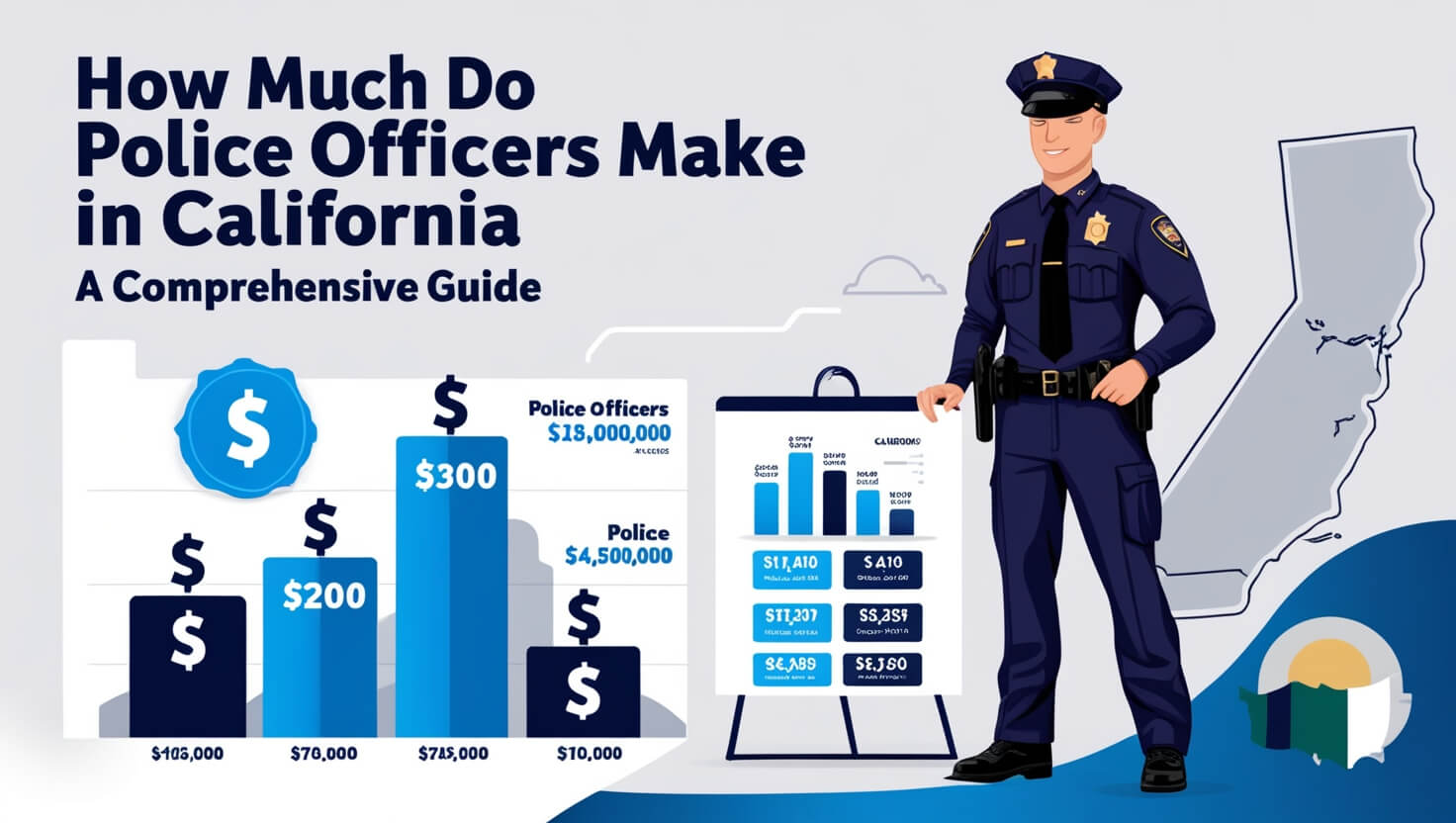How Much Do Police Officers Make in California: Comprehensive 2024 Guide

Police officers play a crucial role in maintaining law and order in our communities. If you’re considering a career in law enforcement or simply curious about police salaries, you might wonder: how much do police officers make in California? The average salary for police officers in California is $80,950 per year, but earnings can vary widely based on factors like location, experience, and rank.
In this guide, we’ll explore the ins and outs of police officer pay in the Golden State. We’ll cover salary ranges, regional differences, benefits, career progression, and more. Whether you’re a aspiring officer or just interested in the topic, you’ll find valuable insights here.
Police Officer Salaries in California
The Importance of Understanding Police Compensation
Knowing how much police officers earn is crucial for several reasons. It helps:
- Potential recruits make informed career decisions
- The public understand how their tax dollars are spent
- Policymakers ensure fair compensation for law enforcement
Factors Influencing Police Officer Pay in California
Several factors affect how much California police officers earn:
- Location (city vs. rural areas)
- Years of experience
- Rank and specialization
- Education level
- Department size and budget
Average Salary for Police Officers in California
Statewide Median Earnings for Law Enforcement
As mentioned earlier, the average police officer salary in California is $80,950 per year. This translates to about $38.92 per hour. However, this figure is just a starting point.
Salary Range: From Entry-Level to Experienced Officers
Police officer salaries in California span a wide range:
- Entry-level positions start at around $62,225 per year
- Experienced officers can earn up to $106,907 annually
This range shows the potential for significant salary growth over a police officer’s career.
Regional Variations in California Police Officer Pay
Top-Paying Cities for Police Officers in California
Some California cities offer higher salaries to attract and retain quality officers. Here are some top-paying cities:
- Irvine: $103,750
- Davis: $98,525
- Los Angeles: $89,502
- Glendale: $88,276
- Oakland: $88,134
Salary Differences Between Urban and Rural Areas
Urban areas typically offer higher salaries due to:
- Higher cost of living
- Increased crime rates
- Larger department budgets
Rural areas might offer lower base pay but often come with a lower cost of living and different job demands.
Breakdown of Police Officer Compensation Package
Base Salary Components
A police officer’s base salary is just part of their total compensation. It’s typically determined by:
- Rank
- Years of service
- Performance evaluations
Additional Pay: Overtime, Bonuses, and Special Assignments
Officers can boost their earnings through:
- Overtime pay
- Holiday pay
- Night shift differentials
- Special assignment bonuses
For example, in Los Angeles, additional pay can range from $13,000 to $24,000 per year on top of base salary.
Benefits and Retirement Plans for California Police Officers
California police officers often enjoy comprehensive benefits packages, including:
- Health, dental, and vision insurance
- Paid vacation and sick leave
- Life insurance
- Pension plans
Many departments offer a “3% at 50” retirement plan, allowing officers to retire at 50 with 3% of their highest salary for each year served.
Career Progression and Salary Growth for Police Officers
Salary Increases Based on Experience and Rank
As officers gain experience and climb the ranks, their salaries typically increase. Here’s a general progression:
- Police Cadet
- Police Officer
- Police Detective
- Police Sergeant
- Police Lieutenant
- Police Captain
- Police Chief
Each step up usually comes with a significant pay bump.
Promotional Opportunities and Their Impact on Earnings
Promotions can significantly boost an officer’s earnings. For instance:
- A Police Lieutenant in Los Angeles can earn around $155,000 per year
- A Police Detective might make $167,000 annually
These higher-ranking positions often come with additional responsibilities and require more experience or education.
Comparing California Police Officer Salaries to Other States
How California Ranks Nationally in Law Enforcement Pay
California consistently ranks among the top-paying states for police officers. It often competes with states like:
- New Jersey
- Washington
- Alaska
Cost of Living Adjustments and Real Wage Comparisons
While California offers high nominal salaries, it’s important to consider the state’s high cost of living. When adjusted for living expenses, the real value of these salaries might be closer to the national average in some cases.
Education and Training: Impact on Police Officer Salaries
How Advanced Degrees Affect Earning Potential
Many departments offer education incentives. Officers with degrees often earn more:
- Associates Degree: 2.5% pay increase
- Bachelor’s Degree: 5% pay increase
- Master’s Degree: 7.5% pay increase
These percentages can vary by department.
Specialized Training and Its Influence on Compensation
Specialized skills can lead to higher pay. Examples include:
- SWAT team training
- K-9 handling
- Bomb squad certification
- Bilingual skills
Officers with these skills often qualify for special assignment pay or promotions to specialized units.
The Role of Police Unions in Salary Negotiations
Collective Bargaining and Its Effect on Officer Pay
Police unions play a crucial role in negotiating salaries and benefits. They advocate for:
- Fair wages
- Better working conditions
- Comprehensive benefits packages
Recent Trends in Police Union Agreements in California
Recent union negotiations have focused on:
- Addressing staffing shortages
- Improving officer wellness programs
- Balancing public safety needs with budget constraints
Some agreements have resulted in multi-year contracts with gradual pay increases.
Budget Constraints and Their Impact on Police Salaries
How City and State Budgets Affect Law Enforcement Pay
Police department budgets directly impact officer salaries. Factors influencing these budgets include:
- Local tax revenue
- State funding allocations
- Federal grants
In times of budget cuts, departments might freeze hiring or limit pay raises.
Recent Legislative Changes Influencing Police Compensation
Recent legislation has affected police compensation in various ways:
- Police reform bills may redirect funds to training and accountability measures
- Some cities have increased police budgets to address rising crime rates
- Pension reform efforts have altered retirement benefits for new hires
Special Units and Their Pay Scales
SWAT, K-9, and Detective Unit Salary Differences
Specialized units often come with higher pay:
- SWAT team members might earn 5-10% more than regular patrol officers
- K-9 handlers often receive extra pay for caring for their dogs off-duty
- Detectives typically earn more due to the complex nature of their work
Hazard Pay and Specialty Position Bonuses
Officers in high-risk or specialized positions may receive additional compensation:
- Bomb squad technicians
- Undercover narcotics officers
- Gang unit members
These bonuses acknowledge the added dangers or skills required for these roles.
Gender and Diversity: Examining Pay Equity in California Police Forces
Addressing the Gender Pay Gap in Law Enforcement
While progress has been made, a gender pay gap still exists in many police departments. Efforts to address this include:
- Blind hiring processes
- Mentorship programs for female officers
- Regular pay equity audits
Diversity Initiatives and Their Impact on Salaries
Many departments are working to increase diversity in their ranks. This can affect salaries by:
- Creating new positions focused on community relations
- Offering bilingual pay differentials
- Implementing inclusive promotion practices
Future Outlook for Police Officer Salaries in California
Projected Salary Trends for the Next 5 Years
Based on current trends, police officer salaries in California are likely to:
- Continue rising to keep pace with inflation
- See larger increases in cities facing officer shortages
- Potentially face pressure from budget constraints in some municipalities
Factors That May Influence Future Pay Scales
Several factors could impact future police salaries:
- Changes in crime rates
- Technological advancements in law enforcement
- Shifts in public perception of policing
- Economic conditions affecting city and state budgets
How to Maximize Earnings as a California Police Officer
Strategies for Career Advancement and Higher Pay
To boost earnings, officers can:
- Pursue higher education
- Seek specialized training
- Apply for promotions regularly
- Consider transferring to higher-paying departments
- Take on leadership roles in the union or department initiatives
Additional Income Opportunities for Law Enforcement Professionals
Many officers supplement their income through:
- Off-duty security work
- Teaching at police academies
- Consulting on security matters
- Writing or speaking about law enforcement topics
In Conclusion
Police pay in California isn’t simple. Many things affect how much officers earn. The average salary is $80,950, but real pay varies a lot.
Some key points:
- New officers make around $62,000, while veterans can earn over $106,000
- City jobs usually pay more than rural ones
- Special skills and higher ranks mean bigger paychecks
- Benefits and pensions add value beyond the base salary
California offers good pay for police work, but the job has risks too. This info helps everyone understand police pay better – from new recruits to current officers to regular folks. As police work changes, keeping up with salary trends matters.






